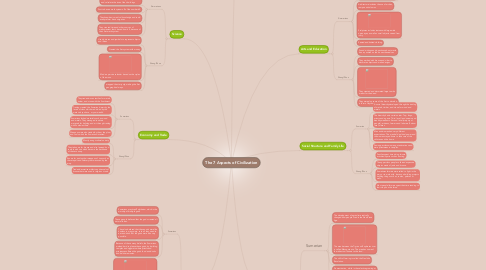
1. Science
1.1. Simmerians
1.1.1. They were the first to learn geometry to build and calculate the size of their buildings
1.1.2. First to base a math system off of the number 60
1.1.3. They knew basic medical knowledge and could even preform basic surgeries
1.1.4. They created time and other sources of measurement that's based from 60, because of their first math system
1.2. Shang/Zhou
1.2.1. Used pictures and symbols to represent objects and ideas
1.2.2. Created the first system with money
1.2.3. Made a percise calendar based on the cycles of the moon
1.2.4. mapped the starry sky, making the first geographical maps
2. Economy and Trade
2.1. Sumerians
2.1.1. They traded woven textiles for metals, timber, and stone with the Southwest.
2.1.2. Trading created the Sumerian hierarchy, the levels of class which are divided by the materials you have, or your wealth.
2.1.3. Sumerians lacked materials such as wood and metals. They managed to obtain materials for building and art through trading with Southwest Asia.
2.1.4. Weapons were also traded by them, the plow, and tools which the Sumerians invented.
2.2. Shang/Zhou
2.2.1. Mostly an agricultural society.
2.2.2. They're known for bronze and also learned how to work with iron which became the backbone of their economy.
2.2.3. Known for trading their weapons of iron such as the catapult and calavary that was used by the army.
2.2.4. Traded decorative artifacts and vessels of bronze that were used in religious rituals.
3. Religion
3.1. Sumerians
3.1.1. Sumerians practiced Polytheism, which is the worship of multiple gods
3.1.2. These people believed that the gods created all natural forces.
3.1.3. They also believed that these gods were like humans in many ways, such as they need to eat and drink. But the gods were also very possible.
3.1.4. Because of these many beliefs, the Sumerians worked hard to please these gods, by building temples and ziggurats where priests and priestesses offered the gods food and drinks and held ceremonies.
3.2. Shang/Zhou
3.2.1. Most Shang tombs contained valuable items made of jade and bronze , because they most likely believed in an afterlife in which they needed their riches.
3.2.2. Shang religion centered on the idea of ancestor worship, and they would often ask their ancestors for advice through the use of oracle bones.
3.2.3. The Shang offered gifts to their ancestors, in order to keep them happy.They also prepared ritual meals with their ancestors in mind.
3.2.4. Each tombs were buried with hundreds of sacrificed prisoners of war, who were buried with their rulers.
4. Geography and Agriculture
4.1. Sumerian
4.1.1. The development of agriculture radically changed how people lived in the New Stone Age.
4.1.2. The area between the Tigris and Euphrates river is called Mesopotamia. This area has some of the richest soil known to the land.
4.1.3. The shift of farming is called the Neolithic Revolution.
4.1.4. Domestication, which is the selective growing or breeding between plants and animals to make them useful to humans, helped provide people with a larger and more reliable food supply.
4.2. Shang/Zhou
4.2.1. Two major rivers supplied water in China,the Chang Jiang and the Huang He.
4.2.2. Southern China, along the Chang Jiang, was warm and received plenty of rainfall., which made it a good region for growing rice.
4.2.3. North, along the Huang He river, it was cooler and drier It was sustainable for things like wheat and millet.
4.2.4. According to legend, the earliest Chinese were ruled by a dynasty called the Xia.
5. Arts and Education
5.1. Simmerians
5.1.1. Invented the wheel for both pottery and for vehicles
5.1.2. Architecture includes the use of arches, ramps and columns
5.1.3. Sculptures includes statues with large wide open eyes, as well as small objects carved from ivory
5.1.4. Sewed and knitted clothing
5.2. Shang/Zhou
5.2.1. Found writings and questions about oracle bones, written on the bones themselves
5.2.2. They worked with bronze and silver to decorate objects and make designs
5.2.3. They created and decorated large tombs meant for the dead
5.2.4. They were also some of the first to develop a form of rhythm and music
6. Social Structure and Family Life
6.1. Sumerian
6.1.1. A social hiearchy developed through the trading of metals, timber, and stone for wood and metals.
6.1.2. The hiearchy had a certain order. Top; kings, priests and agents. Third level; land owners and wealthy merchants. Second level (majority of people); artisians, farmers and laborers. Bottom level; slaves.
6.1.3. Men and women had very different expectations. The men held political power and the women stayed home to take care of the children and the home.
6.1.4. Few upper-class women got educations and were priestesses in temples.
6.2. Shang/Zhou
6.2.1. Families spent time doing leisure activities/sports such as hunting.
6.2.2. The upper-class people collected expensive objects made of jade and bronze.
6.2.3. Sometimes farmers were called to fight in the army or to work with slaves on building projects building things such as, tombs, palaces or walls.
6.2.4. Most people/farmers spent their time tending to their crops on the farms.
7. Government and Leaders
7.1. Sumerians
7.1.1. Priests held a high status and governed the city-states.
7.1.2. War Chiefs most often ruled as the kings even though battles were happening during this time.
7.1.3. Kings served as god's representatives, they performed ceremonies to please god.
7.1.4. Through time, kings formed dynasties; series of rulers from one family.
7.2. Shang/Zhou
7.2.1. Ruled by a monarchy which was surrounded by court; gathering of wealthy nobles.
7.2.2. Courts peformed rituals to strengthen the kingdom and to keep the kingdom safe, they also had a large army to prevent rebellions throughout the kingdom and to fight in battles.
7.2.3. The kings appointed goveners to rule distant parts of the kingdom.
7.2.4. They also followed the Mandate of Heaven; gods would support a ruler to not allow any one to corrupt to hold power.
